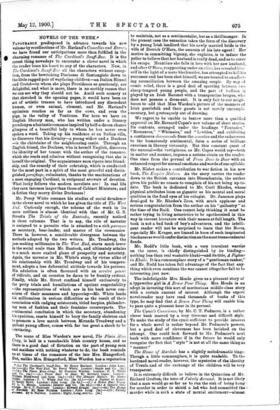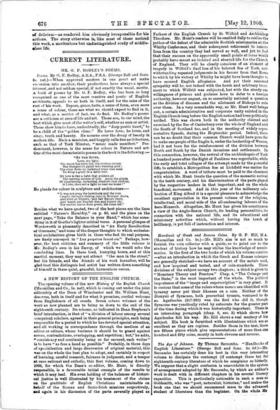NOVELS OF THE WEEK.*
11.4.9OTJEABLT predisposed in advance towards his new volume by recollections of Mr. Harland's Comedies and Error we have found our anticipations more than fulfilled in the O charming romance of The Cardinal's Sntif-Box. It is the rarest thing nowadays to encounter a clever novel in which the reader loses his heart to any of the characters. Now, in The Cardinal's Sautr-Box all the characters without excep- tion, from the bewitching Duchessa di Santangiolo down to the little ragged pair of wayfaring children—an Italian Hansel and Gretel—to whom she plays Providence so graciously, are delightful, and what is more, there is no earthly reason that we can see why they should not be. Amid such scenery as that sketched in the opening pages, it would have been an act of artistic treason to have introduced any discordant human, or even animal, element, and Mr. Harland's optimism reaches as far as the cows, and even the pigs, in the valley of Ventirose. For hero we have an English literary man, who has written under a literary pseudonym a fantastic romance inspired by half-a-dozen chance glimpses of a beautiful lady to whom he has never even spoken a word. Taking up his residence at an Italian villa, he discovers that his divinity—a young widow and a Duchess —is the chatelaine of the neighbouring castle. Through an English friend, the Duchess, who is herself English, discovers the identity of her tenant with the author of the romance, which she reads and admires without recognising that she is herself the original. The acquaintance soon ripens into friend- ship, and the comedy of their cohrtship, which is conducted for the most part in a spirit of the most graceful and distin- guished persiflage, culminates, thanks to the machinations of a most engaging Cardinal, in reciprocal avowals of devotion. What lucky fellows the modern novelists are ! In real life they earn incomes larger than those of Cabinet Ministers; and in fiction they marry divine Duchesses!
Mr. Percy White resumes his studies of social decadence in the clever novel to which he has given the title of The West End. Carionsly enough, the scheme of the work in its main outlines is almost identical with that of Mr. G. S. Street's The Trials of the Bantocks, recently noticed in these columns. That is to say, the rOle of narrator is assigned to a parasite who is attached to a rich parvenu as secretary, bear-leader, and master of the ceremonies There is, however, a considerable divergence between the methods adopted by the two writers. Mr. Treadway, the jam-making millionaire in The West End, starts much lower in the social scale than Mr. Bantock, and ultimately attains to a much more exalted plane of prosperity and notoriety. Again, the narrator in Mr. White's story, by virtue alike of his relationship with Mr. Treadway and of his tempera- ment, adopts a less deferential attitude towards his patrons. His adulation is often flavoured with an arrie're pens.`,, of ridicule, and on occasion he dares to be frankly critical. Finally, while Mr. Street confined himself exclusively to the petty trials and humiliations of opulent respectability —the representatives of which are in his book never con- scious of their meanness and hypocrisy—Mr. White lands his millionaires in serious difficulties as the result of their association with cadging aristocrats, titled harpies, philander- ing men of fashion and their feminine counterparts. The sentimental conclusion in which the secretary, abandoning his cynicism, exerts himself to bury the family skeleton and to promote a love match between Miranda Treadway and a gallant young officer, comes with far too great a shock to be convincing.
The scene of Miss Warden's new novel, The Plain Miss Cray, is laid in a ramshackle Irish country house, and as there is a good deal of flirtation on the part of young men and maidens with nothing whatever to do, the book reminds us at times of the romances of the late Mrs. Hungerford. But, unlike Mrs. Hnngerford, Miss Warden has a reputation • (L) The Cardinai's Snuff-Box. By Henry Harland. London : John Lane. [CS.] s.) The West End. By Percy White. London : Sands and Co. Les.i The Plain Kiss ■Orase. By Florence Warden. London : F. T. White arid Co. [Ca.)—(4.) From Door to Door. By Bernard Capes. London : Blackwood and Sons. [6a.1—(5.) The Empire Makers. By Hume Nisbet. London : F. V. White and Co. [Ss. Cd.]—(6.) A Fighter in 1.4aki. By Ralph Rodd, London : John Long. Ds. Cd.]—(7.) A. Brave Poor Thing. By L. T. Meade. London : Mister and Co. Ds. 6d.]—(8.) d Cynic's Con- science. _B7 C. T. Podinore. London : Edward Arnold. Lea]—(9.) The House Bane Perkins. London : John Low. (0.1--(10.) Falsely atvialla. By G. /19rWay". London : MEV, Long, and Co. (641.] to maintain, not as a sentimentalist, but as a thrillmonger. In the present case the sensation takes the form of the discovery by a young Irish landlord that his newly married bride is the wife of Derrick O'Hara, the assassin of his late agent ! Her motive in committing bigamy, she explains, is to induce the police to believe that her husband is really dead, and so to cover his escape. Meantime she falls in love with her new husband, and after O'Hara, reappearing under an Cilia has revealed h itu - self in the light of a mere blackmailer, has attempted to kill his successor and has been shot himself, we are treated to an affect- ing reconciliation between the amazing couple. By way of comic relief, there is a good deal of sparring between two sharp-tongued young people, and the part of buffoon is played by an Irish Baronet with a transpontine brogue, who does not possess a dress-suit. It is only fair to our neigh- bours to add that Miss Warden's picture of the manners of Irish gentlefolk and their guests is not merely uncompli- mentary, but grotesquely out of drawing.
We regret to be unable to bestow more than a qualified approval on Mr. Bernard Capes's new volume of short stories. Its contents, arranged under the headings " Fantasies," "Romances," "Whimsies," and "Levities," and exhibiting a continuous decrescendo from the macabre and the cadaverous to the humorously sentimental, form a series of brilliant exercises in literary virtuosity. But this constant quest of the unusual—the vertiginous, as Mr. Capes would say—both in matter and manner, imposes a serious strain on the reader. One rises from the perusal of Front Doo,. to Door with an enhanced respect for normal emotions and words of one syllable.
Mr. Nisbet makes a contribution to war fiction in his new book, The Empire ..1fakus. As the story carries the reader down to the British entrance into Bloemfontein, the author gives his public no reason to complain of his not being up-to- date. The book is dedicated to Mr. Cecil Rhodes, whose physical attributes loom as gigantic as his mental and moral qualities in the fond eyes of his eulogist. Dr. Jameson plays demi-god to Mr. Rhodes's Zeus, with much applause and serious congratulation from the author on his "gallantry " at the time of the Raid. One cannot help thinking it must be rather trying to living notorieties to be apotheosised in this way in current literature with their names at full length. The book is not a bad book of boy's adventures, and the intelli- gent reader will not be surprised to learn that the Boers, especially Mr. Kruger, are limned in hues of such inspissated blackness as would confer distinc don on the most transcendental fiends.
Mr. Road's little book, with a very truculent warrior on the cover, is chiefly distinguished by its binding— nothing less than real washable khaki—and its title, Al Fighter in Khaki. It is a commonplace story of a " gentleman ranker," and Mr. Rodd has taken full advantage of the fact that any- thing which even mentions the war cannot altogether fail to be interesting just now.
The indefatigable Mrs. Meade gives us a pleasant story of a typewriter girl in A Brave Poor Thing. Mrs. Meade is an adept in investing this sort of meritorious middle-class story with a certain amount of interest. Although the expert novel-reader may have read thousands of books of this type, he may find that A Brave Poor Thing will enable him to pass quite a pleasant hour in its perusal.
The Cynic's Conscience, by Mr. C. T. Podmore, is a rather clever book marred by a very tiresome and difficult style. To make the study of the cynic sufficient to provide interest for a whole novel is rather beyond Mr. Podmore's powers, but a good deal of cleverness has been lavished on the attempt. One could look forward to Mr. Podmore's next book with more confidence if in the future he would only recognise the fact that " style " is not at all the same thing as " manner."
The House of liardale has a slightly melodramatic tinge. Though a little commonplace, it is quite readable. To the hardened novel-reader, however, the mysteries of the identity of Ursula and of the exchange of the children will be very transparent.
It is extremely difficult to believe in the Quixotism of Mr. Richard Grafton, the hero of Falsely Accused. It is not likely that a man world go so far as to ran the risk of being hung for murder in order to shield a lad who had committed the . murder while in such a state of mental excitement—almost a delirium—as rendered him obviously irresponsible for his actions. The story otherwise is, like most of those nodded this week, a meritorious but undistinguished study of middle. &ass life.







































 Previous page
Previous page